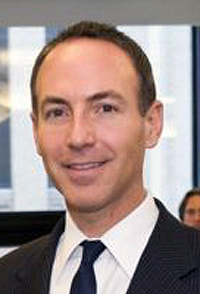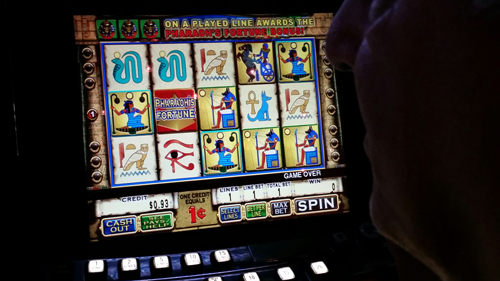
-66th in a Series-
Exit 61, Crestwood Road, Campo ~ Golden Acorn Casino
By Donald H. Harrison

CAMPO, California – The Golden Acorn Casino participates in a multimillion dollar progressive slot machine jackpot fed by the losing bets of players not only here, but also located in numerous other casinos served by International Gaming Technologies (IGT)—a manufacturer and distributor of slot machines and other gaming devices. When I last looked, the possible pot was over $3 million.
For most of the people who gamble in casinos, winning that much money would be the stuff of dreams. It could pay off s mortgage, finance an Ivy League college education, fuel a luxury vacation, and even, perhaps, serve as seed money for starting one’s own business.
The psychological rush that someone might feel from winning that jackpot may resemble, to a tiny degree, the feelings of elation experienced by the investors in the gaming industry when they successfully stage a takeover or a buy-out. Such a rush might approximate how Jason Ader could have felt had he been successful in his effort to win three seats for his designees on the IGT board.

Or, even headier, it might approximate how Wall Street tycoon Ronald Perelman feels whenever he wins control of an important company such as the Revlon cosmetics company or Scientific Games Corporation (SGC), which manufactures slot machines and lottery ticket dispensers, among other products.
Perelman, whom Comic Con fans may remember as the man who won control, then lost it of Marvel Comics and its related enterprises, is famous for buying companies that have expanded into ancillary and unrelated businesses and then selling off those divisions to return the companies to their core specialties. In some cases, the billionaire Perelman has made nearly as much money from selling off the other divisions than the initial purchases cost him.
Ader, who spent many years on Wall Street as a gaming industry analyst, left the sidelines in order to be able to play in the investment arena. He formed Ader Investment Management, which focused on gaming industry opportunities throughout the world. In 2013, Ader owned over 3 percent of the common shares of IGT, and notified the company that he wanted to replace three members of the board of directors, whom he felt did not have the requisite knowledge for their positions. He criticized IGT for purchasing for $500 million the online gaming company Double Down. He said IGT could have provided its own similar product for a fraction of the cost.

NYU Stern School of Business)
Beyond that, he contended that the management and board of directors really didn’t have an economic stake in the success of the company. His 3 percent ownership, he said, amounted to six times as much as the holdings of all the company’s officers and board of directors combined. Clearly, he argued, he had a reason for being more concerned than they that the company’s stock had fallen over the years by 30 percent.
Among the three people whom Ader had proposed for membership on the board was IGT’s former chairman Charles Mathewson, a 17-year-veteran of the industry, who was immediately attacked by the company’s current management for having enriched himself during his tenure with too many company perks. That prompted Steve Wynn, owner of the Wynn Hotels, to come to Mathewson’s defense, and eventually to back Ader’s attempt to repopulate the board.
Following a proxie fight, Ader was able to put only one new member—Daniel Silvers, the Managing Member at Matthews Lane Capital Partners –on the board, thereby increasing the IGT board’s size from 9 to 10. However, within eight months, Silvers resigned, and Ader and IGT announced that their differences had been settled. Ader agreed not to initiate any other action against IGT for at least four years, and IGT agreed to refund over $2 million that Ader had spent for the proxie fight. Both sides said their agreement had put the company in a stronger position, and the board membership was once again put at 9.
Perelman’s Scientific Games Corporation recently purchased Bally, the oldest and perhaps in the public’s eyes the best known manufacturer of slot machines. Scientific Games Corporation previously had acquired WMS, another manufacturer of gaming devices, so the company is now beefed up for head-to-head competition with IGT. Golden Acorn Casino utilizes slot machines of WMS and IGT manufacture, but not Bally.
Our “Jewish story” in all this is that Ader, Silvers, and Perelman are members of the Jewish community.

In many cases, IGT slot machines and video devices are named after popular television shows. For example, some of the slot machine products offered to casinos such as The Golden Acorn include “Wheel of Fortune,” “The Price is Right,” “Jeopardy,” “Family Feud,” “Let’s Make a Deal,” “The Newlywed Game,” “Sex and the City,” “The Amazing Race,” “Star Wars,” and “Elvis.”
The Golden Acorn Casino, on its website, has been advertising that among its 750 slot machines and video games are such other IGT games as “Cleopatra,” “Kitty Glitter,” “Wolf Run,” “Texas Hold ‘Em,” “Davinci Diamonds” and “Siberian Storm.”
Had Golden Acorn chosen the Bally division of Scientific Games Corporation as its provider, the lights and bells ringing on its casino floor would be from such games as “Pawn Stars,” “Midnight Diamonds,” “Quick Hit Pro,” “Shadow Diamond,” “Quick Hit Las Vegas,” “Sumo Kitty;” Hand of the Devil,” “Moon Goddess;” “Double Dragon” and “Aloha Island” to name just a few.
Slot machines have come a long way from their beginnings. No longer are payouts simply based on the three symbols that show up after a spin on the center line; now one may bet many different lines, horizontal, diagonal, and even zig zag simultaneously. To win the loyalty of younger consumers, some slot machines also have been combined with video games, requiring a certain level of skill in addition to chance.
For the Campo Kumeyaay Nation, which counts 365 tribal members and spouses and dependents, the casino is but one effort to bring prosperity to the historically impoverished 16,512-acre reservation in San Diego’s back country. With three major Indian casinos—Viejas, Sycuan, and Barona—situated between Campo and San Diego, large crowds of gamblers never even see the Golden Acorn Casino. It does have the advantage, however, of being the first casino in San Diego County that is accessible to westbound traffic on the Interstate 8.
With more and more states permitting forms of off-reservation gambling, there always is the chance that the gaming market will become saturated, and that operations such as the Golden Acorn will suffer even more adversely from the competition.
Both to diversify and to supplement the reservation’s income, the Campo Kumeyaay nation has built a combination gas station and travel center to accommodate passing motorists and truckers. It offers laundry facilities, hot showers, a quick-serve delicatessen, and packaged snacks in addition to gasoline.

More visually striking are the 25 wind turbines of Kumeyaay Wind for which the Campo band has provided the land for a share of the revenues. Since 2006, Kumeyaay Wind has been producing 50 megawatts of clean energy, which is carried via the Sunrise Power Link to a substation of San Diego Gas & Electric Co. Kumeyaay Wind helps to assure that the utility meets its goal of utilizing clean energy sources for 33 percent of the power delivered to customers. Kumeyaay Wind and other wind and solar sources, mostly in the Imperial Valley, enable the Sunrise Power Link to consistently supply 1,000 megawatts of sustainable energy to customers, according to SDG&E spokesman Hanan Eisenman.
As imposing as these wind turbines are, and as important as they are towards the goal of decreasing California’s reliance on fossil fuels, the turbines are not a panacea for the reservation’s economic problems. Falling energy prices have decreased the amount of money that they generate for the tribe. Property taxes charged by the county decrease the tribe’s net revenues even further.
The Campo Kumeyaay Nation had proposed building a three-story hotel near the casino, but this met opposition during the county’s planning process, and to date no groundbreaking has occurred.
Gambling is risky, and so too are investments in casinos and energy resources. But what else is a small reservation in a relatively remote location to do?
*
From Crestwood Exit 61, turn right onto Old Highway 80. Casino entrance is on the left.
*
Harrison is editor of San Diego Jewish World. He may be contacted via donald.harrison@sdjewishworld.com